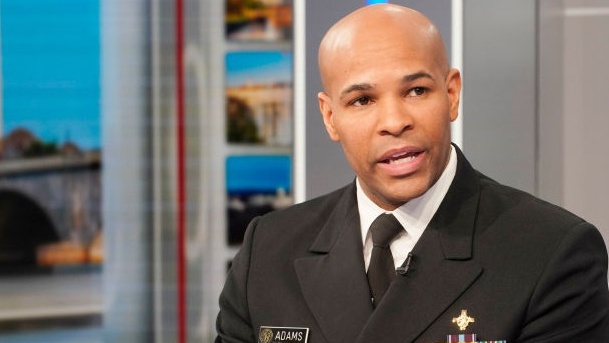Over the last two weeks, data has increasingly shown how Black communities are being decimated by the coronavirus epidemic. As each day passes, more information is released showing that Black people are disproportionally contracting and dying from COVID-19 in cities like Chicago, New Orleans, Washington D.C. and Milwaukee.
On Tuesday, U.S. Surgeon General Jerome Adams spoke candidly on CBS This Morning about the virus and how it is affecting Black communities across the country, saying that "many Black Americans are at higher risk for COVID.”
The @Surgeon_General says African Americans are at higher risk for COVID-19 and revealed he has high blood pressure & a heart condition.
"I and many black Americans are at higher risk for COVID. That's why we need everyone to do their part to slow the spread." — @JeromeAdamsMD
pic.twitter.com/J4VnOSmOfK— CBS This Morning (@CBSThisMorning) April 7, 2020
"When you look at being Black in America, people, unfortunately, are more likely to be of low socioeconomic status, which makes it harder to social distance. We know that Blacks are more likely to have diabetes, heart disease, lung disease, and I've shared myself, personally, that I have high blood pressure," Adams said.
"I have heart disease and spent a week in the ICU due to a heart condition. I actually have asthma and I'm pre-diabetic. I represent that legacy of growing up poor and Black in America, and I, and many Black Americans, are at higher risk for COVID. That's why we need everyone to do their part to slow the spread," he said.
Black people across the country have demanded that the CDC and federal agencies release more data on the demographic information associated with the infection rate and death toll of the novel coronavirus, according to The Washington Post.
In a letter to Health and Human Services Secretary Alex Azar on April 6, the Lawyers’ Committee for Civil Rights Under Law said the Trump administration’s "alarming lack of transparency and data is preventing public health officials from understanding the full impact of this pandemic on Black communities and other communities of color."
"We are concerned that Black communities are being disproportionately impacted by the pandemic, and have lower access to COVID-19 testing which may cause delayed care, an increased risk of high mortality rates, and the acceleration of the spread of the disease in our communities," the letter continued.
During the first week of April, ProPublica released one of the first studies showing that Black Americans were particularly at risk for dying from COVID-19. The study found that in Milwaukee County Black people account for 81% of its 27 deaths and half of its 945 cases while only making up 26% of the county's population.
Since that report, more cities have begun releasing demographic data, confirming what many in the Black community have long feared. In Illinois, Michigan, North Carolina and Louisiana, the percentage of Black people who have contracted COVID-19 and have died from it is higher than other races.
BREAKING NEWS: Louisiana just released COVID-19 data which shows that African-Americans account for 70% of ALL DEATHS in the state.
African-Americans makes up roughly 32% of the population. #COVID19
— Elizabeth Thomas (@lizzkatherine_) April 6, 2020
As Adams, doctors and community activists have noted, Black communities have higher rates of asthma, high blood pressure, heart disease and diabetes, putting them at a higher risk of suffering from complications stemming from the virus.
The letter from the Lawyers’ Committee for Civil Rights Under Law also noted it has been nearly impossible for Black people to get tested for the coronavirus and explained that just 20% of Black people have the ability to work from home.
"People of color, and in particular women of color are overrepresented in low-wage jobs such as childcare and home health care. These groups on the frontline face a higher degree of risk exposure to COVID-19 through public-facing jobs, which have been deemed 'essential,'" the letter stated.
The letter also highlighted how the widespread layoffs in the travel, retail, restaurant and hospitality industries disproportionately hurt Black families.
Adams said the CDC and other government agencies should "absolutely" be tracking the virus based on demographic groups and added that it was important that all Americans chip in to help those most in need.
"It breaks my heart. My recommendation is to understand that you are at risk, you are not immune. And my recommendation is to all of America that we're really doing this to protect not just ourselves, but each other," he said. "But America has the power to change the trajectory of this epidemic. The public really needs to keep doing their part."
